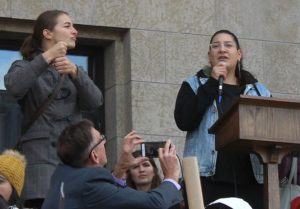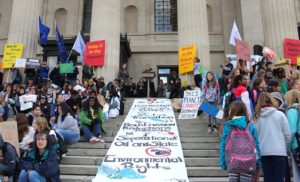By Sadie-Phoenix Lavoie
From September 20-27th, over 7.6 million people in 185 countries participated in more than 6,100 Global Climate Strike protests, 85 of which were Canadian cities and towns, including 1 million Canadians and 15 thousand people in Winnipeg. It has been claimed to be the largest global protest in history. People of all intersectionalities, including “73 trade unions, 820 civil society organizations, 3,000 companies and 8,500 websites” came together to demand stronger action to address Climate Change and to push for environmental policies that meet the Paris Agreement targets including phasing out fossil fuels. In the latest IPCC report, the world’s scientists confirmed that the current rate of released greenhouse gases, largely by fossil fuels, would result in a 1.5˚C increase by 2030.
The Climate Strike was sparked by Greta Thunberg, a 16 year old climate activist who started protesting the Swedish government over a year ago on August 20th 2018 by refusing to go to school on Fridays, and has since sparked a youth movement called Fridays for Future, Youth for Climate, Climate Strike, or Youth Strike for Climate.
Community Coordinator of Wa Ni Ska Tan, Sadie-Phoenix Lavoie spoke at the September 27th global climate strike at the Manitoba Legislative Building, held between 12 – 5pm that included a March down Broadway and water ceremony along the Assiniboine River. There were an estimated 15 thousand people in attendance. The protest was co-organized by MB youth for climate action and Green New Deal MB with 350.org and MEJC. There were numerous speakers including Indigenous speakers: Niigaan Sinclair, professor at UofM; Romeo Saganash NDP MP; Brielle-Beardy Linklater, two-spirit activist; Victoria Inglis, from Strawberry Heart Protectors; Clayton Thomas Muller from 350.org; Elder Betty Ross; Rebecca Sinclair & Youth from Indigenous Lake Winnipeg Collective; & Sierra Smith from Camp Morning Star in Hollow Water First Nation.
Sadie-Phoenix Lavoie’s speech included Hydro development in Manitoba, given how the water flows and levels have been controlled by economic gains in the province, impacting habitats for fish and wildlife, thus affecting the subsistence livelihoods of Indigenous communities in northern Manitoba. Lavoie stressed the importance of a “just” transition away from fossil fuels that respects and honours Indigenous communities rights and their vitally important relationship with the environment. Lavoie goes on to explain how Indigenous communities protect the 80% of the world’s biodiversity yet make up less than 5% of the world population, calling for more support for Indigenous peoples protecting their territories from further resource exploitation. Therefore, the just transition away from fossil fuels towards renewable energy, must respect the environment and Indigenous peoples connection to the lands and waters, including addressing the social, environmental, and economic impacts of hydro development within Manitoba, as it may be increasingly relied upon to mitigate against climate change.

Sadie-Phoenix Lavoie Speaks at the Climate Strike

Youth gathered with their signage at the Legislature Building Steps in Winnipeg
_
1.https://350.org/press-release/6-6-million-people-demand-action-after-week-of-climate-strikes/
2.https://www.ipcc.ch/sr15/
–
The next Friday School Strike will be held on Oct. 11th between 10-11:30am at the MB Legislative Building in Winnipeg, and the next Global Climate Strike is to be held on Friday, November 29, 2019. Event details have not yet been announced.

